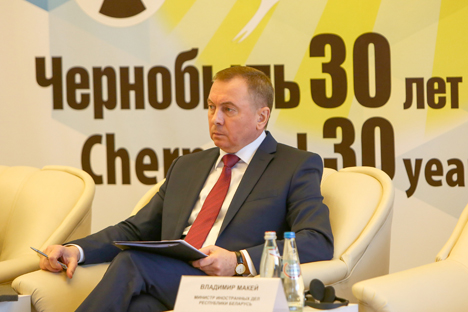News & Events in Belarus
Belarus intends to support actively international Chernobyl cooperation

MINSK, 25 April (BelTA) - Belarus intends to support actively the international Chernobyl cooperation, Belarus’ Minister of Foreign Affairs Vladimir Makei said on the sidelines of the high-level international conference, Thirty Years After Chernobyl. From Emergency to Revival and Sustainable Socio-Economic Development of Affected Territories, BelTA has learned.
During the 30 post-Chernobyl years Belarus has gained unique knowledge and experience to deal with environmental, health and social effects of the catastrophe. “We share this knowledge and experience with our partners and we intend to provide an active support to the international Chernobyl cooperation,” Vladimir Makei said.
The Minister expressed the confidence that the decisions of the conference will strengthen the Chernobyl interaction. In particular, Belarus expects that an initiative to achieve the sustainable development goals in the Chernobyl-affected regions through partnerships, innovation and investment will be launched in 2017, with the support of the United Nations.
According to Vladimir Makei, the Minsk conference will summarize the experience gained during the UN Decade of Recovery and Sustainable Development for Communities Affected by the 1986 Chernobyl Disaster. Belarus has received the technologies and equipment necessary for promoting rehabilitation, protecting the health of people living in the affected regions, and ensuring environmental security. These were the practical results of the Chernobyl cooperation for the country.
Attending the international conference in Minsk is Administrator of the UN Development Program (UNDP) Helen Clark. Vladimir Makei thanked her for the support that the UNDP has provided to Belarus in the matters of a long-term strategy for the development of the affected regions, targeted assistance to those people living in these regions. Vladimir Makei noted that Helen Clark’s visit to Belarus, her meeting with the Belarusian head of state confirms the United Nations commitment to cooperation with Belarus at the highest level.
Belarus’ Minister of Foreign Affairs recalled that the cooperation between Belarus and the United Nations is not only limited to Chernobyl but covers a wide range of social and economic issues. Tens of successful projects have been implemented in health, education, environment, business development. New joint projects are in the pipeline.
The conference, Thirty Years After Chernobyl. From Emergency to Revival and Sustainable Socio-Economic Development of Affected Territories, is running in the Palace of the Republic in Minsk. The participants of the conference will take stock of the UN Decade of Recovery and Sustainable Development for Communities Affected by the 1986 Chernobyl Disaster and will discuss new approaches to multilateral Chernobyl cooperation. The participants of the conference are expected to adopt a Declaration that will make a basis for the development of a new stage in Chernobyl cooperation under the aegis of the United Nations.
Attending the conference are representatives of Belarus, Russia and Ukraine, the Order of Malta, partners from Japan, Sweden, Ireland, the UK, Austria, Italy, representatives of the diplomatic corps accredited in Minsk. The conference is also attended by representatives of international organizations, including the IAEA, the World Bank, the OSCE and the United Nations.
The conference has been organized by the Belarusian government and the UN Development Program.







 print version
print version make home page
make home page add to bookmarks
add to bookmarks

